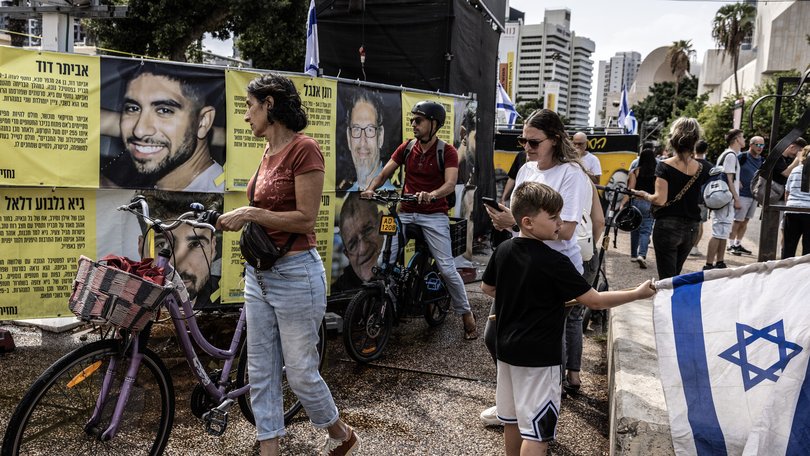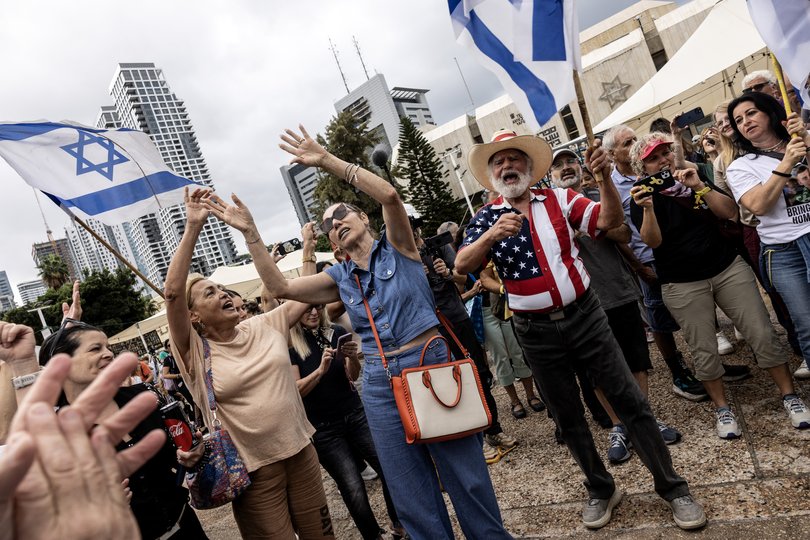THE WASHINGTON POST: Israeli ministers approve Gaza ceasefire, but tougher talks loom
US forces plan a ‘civil military co-ordination centre’ in Israel to provide humanitarian, logistical and security assistance, an official said, but will not deploy to Gaza.

Israeli ministers late Thursday, local time, approved an initial ceasefire with Hamas in Gaza, a deal intended to bring two years of devastating war to an end.
Cabinet approval sets in motion a sequence expected to bring out the release of some 48 Israeli hostages, living and dead, in exchange for hundreds of Palestinians held in Israeli prisons as well as a halt to Israel’s bombardment of the Gaza Strip.
The ceasefire is to take effect within 24 hours of the vote, Israeli government spokeswoman Shosh Bedrosian said. During that window, Israeli forces are to withdraw from parts of Gaza - including most urban population centres - while retaining control of about half of the enclave. Humanitarian aid is to be surged to a population that has suffered hunger and deprivation.
Sign up to The Nightly's newsletters.
Get the first look at the digital newspaper, curated daily stories and breaking headlines delivered to your inbox.
By continuing you agree to our Terms and Privacy Policy.Hamas and allied militants will then have 72 hours to hand over the remaining 20 hostages believed to be alive, as well as bodies of 28 deceased hostages, she said.
Celebrations broke out among Palestinians in Gaza and hostage families in Tel Aviv on Thursday after hearing the news that the sides had reached an agreement in principle.
All of Israeli Prime Minister Benjamin Netanyahu’s objectives for the war in Gaza “have now been achieved,” Ms Bedrosian said. “This is a momentous day.”
But fresh Israeli strikes on Gaza City on Thursday and still unresolved details underscored both the pact’s fragility and the difficult diplomacy ahead if the sides are to establish a lasting peace.
Praise poured in from mediators and world leaders Thursday for President Donald Trump’s role in achieving a deal that his predecessor had been unable or unwilling to close.
Egyptian President Abdel Fatah El-Sisi congratulated Mr Trump “on the success of his tireless efforts to stop the war in the Gaza Strip” and said he deserved the Nobel Peace Prize. The winner is to be announced Friday night.
Mr Trump said Thursday he planned to travel to Egypt for a symbolic signing ceremony.
After Israel broke a two-month ceasefire in March, Mr Trump gave Mr Netanyahu wide latitude to prosecute the war in Gaza as he saw fit. Civilian casualties climbed, and Israeli restrictions on humanitarian aid plunged parts of the enclave into famine.
But Mr Trump’s desire to win the Nobel, coupled with Arab anger over an Israeli strike in Doha, Qatar, last month, built momentum behind the negotiations in this Egyptian resort town this week, according to analysts and officials close to the talks.
Mr Trump envisions the deal reached this week as the first step toward achieving a 20-point framework for peace in Gaza. Tougher discussions on decommissioning Hamas’s weapons and arranging future security and governance in Gaza have largely been deferred until the hostages are released.
Before signing off on the first phase, Hamas had wanted a written promise from the United States that Israel would not resume its attacks in Gaza after Palestinian groups hand over the hostages, their only remaining source of diplomatic leverage.

US representatives Steve Witkoff and Jared Kushner rejected this demand but offered verbal assurances, according to Khaled Okasha, an Egyptian consultant who advised the Palestinian and Egyptian delegations at the talks. Khalil al-Hayya, a senior Hamas official, said the group had received guarantees from US officials and mediators that the war had “fully and completely ended.”
The wording of Mr Trump’s announcement Wednesday, local time - that the preliminary ceasefire and exchange of hostages and prisoners were “the first steps toward a Strong, Durable, and Everlasting Peace” - was understood by mediators in the region as a signal the President was committed to ensuring the war doesn’t resume, Mr Okasha said.
US Central Command is establishing a “civil military coordination centre” in Israel to facilitate the flow of humanitarian, logistical and security assistance into Israel, according to a US official who provided information on the condition of anonymity to discuss developing military plans.
Two hundred US service members with expertise in transportation, planning, security, logistics and engineering will support the operation. The United States will not deploy troops to Gaza, the official said.
In an environment rife with distrust, the coming days will show whether the parties can uphold even the initial phase of a peace deal before they tackle more complex issues.
Mohammed Hajj Moussa, a spokesman for Palestinian Islamic Jihad, a group allied with Hamas in Gaza, cautioned that it might take more than 72 hours to locate some hostages’ remains.
Mr Trump said he hoped all hostages would be back in Israel by Monday or Tuesday. “Getting them is a complicated process,” he said.
Turkey, which sent its intelligence chief to the talks in Sharm el-Sheikh, will help find and unearth the bodies of hostages in Gaza whose burial locations are unknown, Mr Okasha said.
Family members of hostages and their supporters gathered in the Tel Aviv plaza known as “Hostages Square” on Thursday to celebrate the deal.
The father of Guy Illouz, whose remains are being held by Hamas, described a mix of emotions after having fought “every day” for his son’s return.
“It’s kind of happiness with sadness,” Michel Illouz told The Washington Post. “I’m so happy for the families of the hostages that are alive, that they will be able to recover, and I’m sad about my journey.” The hostages’ return, he said, would help Israel “recover as a nation.” As for himself, he said, he would now prepare to bury his son.
Under the framework Mr Trump unveiled last week, Israel is to release 250 Palestinian prisoners serving life sentences, along with 1,700 people, including all the women and children, detained from Gaza since the Hamas-led attack of October 7, 2023.
In the hours leading up to the Israeli cabinet meeting, officials from Hamas and Palestinian Islamic Jihad said the parties were still wrangling over the names of prisoners slated for release.
“Israel is still stalling on issues related to withdrawal, prisoner lists, and the return of displaced residents,” Hamas spokesman Hazem Qassem told Hamas-run television channel Al-Aqsa.
Israeli negotiators have vetoed some of the prisoners that Hamas and other Palestinian groups wished to see released, Mr Okasha said. They included Marwan Barghouti, 66, a prominent Palestinian political figure who has been imprisoned for more than two decades over alleged connections to violent attacks in Israel. He remains widely popular among Palestinians.
Barghouti “will not be part of this release,” Ms Bedrosian confirmed.
Nor will Israel release the bodies of Hamas leaders Yahya Sinwar, killed in October 2024, or his brother, Mohammed Sinwar, killed in May, Mr Okasha said.
Humanitarian aid was to be surged into Gaza as early as Friday morning, Mr Okasha said, at Mr Sisi’s insistence. Under Mr Trump’s framework, UN and international organizations are to distribute supplies.
The United Nations has 170,000 metric tons of food, medicine and other goods waiting outside the enclave to deliver over the first 60 days of a ceasefire, UN aid coordinator Tom Fletcher said.
“We are ready to roll,” he told reporters. He said participating agencies aimed “to increase the pipeline of supplies to hundreds of trucks every day” to reach Gaza’s 2.1 million people, will work swiftly to restore Gaza’s “decimated health system,” fuel deliveries and the water and sanitation system, and will oversee a “massive scale-up” of tents and shelter for the fall rainy season and winter.
Still, contractors distributing food for the US- and Israeli-backed Gaza Humanitarian Fund have not been told to wind down their operations, according to a person familiar with the operation, and they were preparing to open a site in northern Gaza.
A halt to Israeli attacks and the entry of large amounts of aid will bring needed relief to Gazans, virtually all of whom have been forced from their homes, and many of whom are hungry, ill or wounded.
Hamas-led fighters killed some 1,200 Israelis on October 7, Israeli officials say, and took another 250 back to Gaza as hostages. Israeli forces have since killed more than 67,000 people in Gaza, according to the enclave’s health ministry, which does not distinguish been militants and civilians but says the majority of the dead are women and children.
“I felt a bit of hope last night when I saw the news about this ceasefire agreement,” Husam Abu Jabal, 32, told The Post by phone from Gaza City. “I even saw people celebrating in the streets. … But it’s a happiness that feels incomplete.
“This war has changed everything in our lives, our people, our land.”
Gazan hopes for peace and rebuilding have previously been dashed: Two ceasefires came and went, only for death and destruction to resume.
“I’m not sure this ceasefire will last,” Abu Jabal said. “Maybe it will hold at first, but we’ve heard about so many ceasefires before: halts to the bombings, the pauses, the prisoner exchanges.”
Meanwhile, the interlude between the announcement of the deal and the start of the ceasefire has been deadly. People in Gaza City said explosions sounded throughout the day Thursday. An Israeli airstrike on a home there Thursday night left 40 people trapped under rubble, according to Gaza’s Civil Defense. Rescuers were working to dig them out.
© 2025 , The Washington Post
